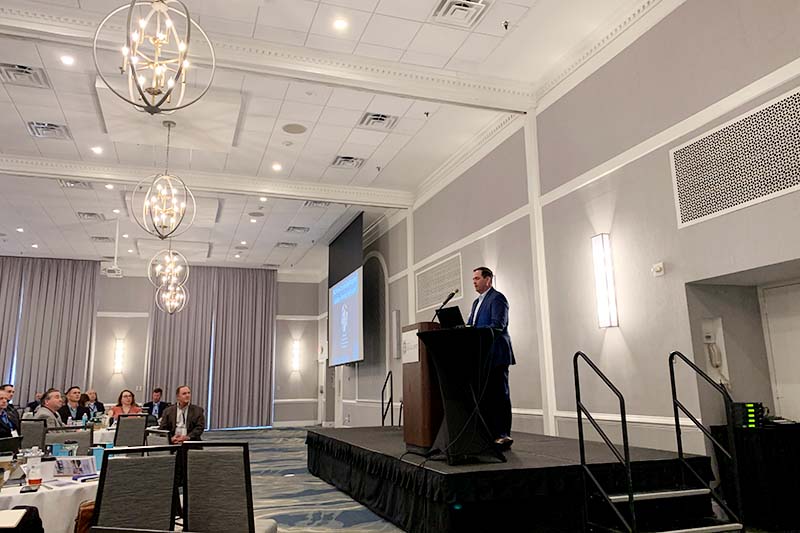
North Carolina State Ports Authority’s fifth annual cold chain summit convened a variety of stakeholders at the day-long conference Tuesday, who reflected on the past year of disruptions, redirections and reimagined paths forward in the transportation scene.
The pandemic-prompted supply chain disruptions brought an entire industry into the limelight that had grown accustomed to operating in the background, and now, is navigating an entirely uprooted scene.
Various government and business panelists were featured at the conference, who reflected on their respective expertise aligning with the summit’s theme and title, “The Big Chill: Fresh, Frozen and Beyond.” It was also an opportunity for port and state officials to highlight recent capital improvements and attempt to sway audience members, many representing major business interests, to conduct more activity at the port.
Ports’ director Brian Clark spoke about plans to expand beyond the fenceline and add even more refrigerated storage space. “The Amazon effect continues to compound,” he said, adding that traditional models are no longer sufficient. Congestion at other ports has led to the Port of Wilmington’s surge in bulk- and break-bulk cargo, which has been handled at record levels, Clark said.
Since the Port of Wilmington Cold Storage facility opened in 2016, several additional private investments in cold storage have followed, locating near the port facility or in the area. Roughly $300 million in investments among new cold storage projects are actively being constructed, according to an estimate shared by Cliff Pyron, Wilmington Business Development’s director of business development. These facilities are being designed to cater to both cold imports and exports – an important balance to ensure cold containers continue flowing through the port.
“It’s very important to get the equipment in,” said Craig Bair, director of sea logistics healthcare North America for Kuehne + Nagel Inc., referencing the importance of importing refrigerated commodities. “If we can’t get the equipment in, we can’t move the cargo out.”
Randall Johnson, executive director of the Southeastern office of the North Carolina Biotechnology Center, said the area’s biggest challenge as it relates to cold chain is the lack of adequate cold storage space. “We’ve got at least some answers to that on the way… There will be a significant cold storage need that we just don’t have right now.” The need is driven by a recent and anticipated influx of biopharma manufacturing companies locating in N.C. and new international and national regulatory requirements. “The opportunity is huge,” he said.
Blake Brown, an N.C. State University professor of agricultural and resource economics, gave a macro look at the state of agriculture, which has been hit with rising production costs.
Feed costs rose 30-35% over the past two years in the U.S., he said: “That has to be absorbed somehow.” Soaring fertilizer costs, already a challenge before, have been exacerbated by Russia’s war on Ukraine. It appears some expenses, including freight costs, already reached their peak and are headed back down, he said. Also, the national load-to-truck ratio seems to have turned a corner early last month, data shows. “In other words, we didn't have enough trucks to ship and carry all of the pent-up demand for products that we had,” he said.
Ocean shipping rates, which recently hit all-time highs, may have also already peaked, Brown said. Production costs are “out the wazoo,” Brown said: “It’s really crunching farmers’ profits. They’re trying to figure out how they can just cash flow this year, that’s how severe this is.”
Policy instability with China and the country’s rehabilitated swine herds, which will decrease its recent reliance on importing pork from elsewhere, are reasons domestic producers and shippers should focus on diversification, Brown said. Competition with Brazil will remain fierce, he added.
“If I were looking long-term, my one concern for our protein sector would be the evolution of the production of meat or meat substitutes,” Brown said, reflecting on the various uses of soybeans.
On a “frozen” panel featuring business interests, moderator Dana Magliola, N.C. Department of Transportation program manager for freight and logistics, said, “We’re in a new world. What has worked in the past won't work in the future.”
Panelists addressed the importance of technology in shipping, including temperature-controlled containers with ocean-tracking location technology. “We've got to know where those containers are,” said Shelly Phalen, Smithfield’s vice president of international logistics and finance.
Maersk representative Bob O’Donnell, who heads up the company’s cold chain logistics department in North America, said the business is beefing up its hiring of technologists, with 1,000 new hires coming on board this year. Maersk brands operate 384,000 refrigerated (reefer) containers, O’Donnell said, representing roughly 40% of the world’s reefer fleet.
“Pharmaceuticals is definitely one of our top growth areas in the coming year,” O’Donnell said. Traditionally, pharma and life sciences companies have sought out air freight to transport their products, but recently, many are “looking to start going into a more sustainable ocean solution.”
“We've got strict operational controls. We've got asset control, we've got some good technology,” he said. “We're doing some things globally with pharmaceuticals, and we're looking to bring that here.”
Passenger Rail Study Offers New Details About Proposed Wilmington To Raleigh Route
Emma Dill
-
Apr 22, 2024
|
|
Severe Weather Postpones Trump Rally In Wilmington
Emma Dill
-
Apr 20, 2024
|
|
Will NC Be CNBC's Three-time Top State For Business?
Audrey Elsberry
-
Apr 22, 2024
|

“My mission and my goal is to take my love of marine science, marine ecosystem and coastal ecosystems and bring that to students and teacher...

Lydia Thomas, program manager for the Center for Innovation and Entrepreneurship at UNCW, shares her top info and tech picks....

W.R. Rayson is a family-owned manufacturer and converter of disposable paper products used in the dental, medical laboratory and beauty indu...
The 2024 WilmingtonBiz: Book on Business is an annual publication showcasing the Wilmington region as a center of business.
